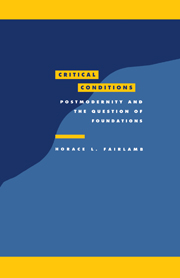Book contents
- Frontmatter
- Contents
- Preface
- Acknowledgments
- List of abbreviations
- Introduction
- 1 Fish's strong conventions: the mind's own world
- 2 Brave new words: postmodernism on epistemology
- 3 Theory and/or deconstruction: Derrida's slippage
- 4 Gadamer's universalism: the limits of hermeneutic authority
- 5 Critical politics: deconstruction for Americans
- 6 Foucault's microphysical politics: Big Brother is missing
- 7 Habermas' neo-formalism: theory as praxis
- 8 Critical theory and postmodern localism: rebels without a cause
- Conclusion
- Bibliography
- Index
Conclusion
Published online by Cambridge University Press: 01 June 2011
- Frontmatter
- Contents
- Preface
- Acknowledgments
- List of abbreviations
- Introduction
- 1 Fish's strong conventions: the mind's own world
- 2 Brave new words: postmodernism on epistemology
- 3 Theory and/or deconstruction: Derrida's slippage
- 4 Gadamer's universalism: the limits of hermeneutic authority
- 5 Critical politics: deconstruction for Americans
- 6 Foucault's microphysical politics: Big Brother is missing
- 7 Habermas' neo-formalism: theory as praxis
- 8 Critical theory and postmodern localism: rebels without a cause
- Conclusion
- Bibliography
- Index
Summary
Men seem to be incapable of facing an antinomy and not worshipping the terms.
E. GilsonPhilosophy's ambiguous end
Recent discussions of “the end of philosophy” indicate the depth of current interest in the problem of foundations. But our critique of the current debate suggests that this issue can be understood in either a misleading or an illuminating way.
It would be misleading, for instance, to suggest that philosophy is obsolete because its foundationist impulse is necessarily reductive, always oppressive, and ultimately wrong. It is also misleading to conclude that no useful distinctions have been discovered by the search for the most general conditions of knowledge, even if philosophy has discovered no absolute warrant of knowledge or meaning. Likewise it does not follow, as anti-foundationists suggest, that the choice for or against philosophy involves a choice between literary criticism and Plato's philosopher-king, between social nihilism and a universalist prescription for the rational society, or between emancipatory localisms and Skinnerean technocracies.
This all-or-nothing view of the search for critical conditions degenerates into false dilemmas between objectivity and freedom, domination and anarchy. In pragmatic terms the significance of the foundationist debate is not that we must choose between reduction and anarchy, but that we cannot so choose, since neither option works. It is no accident, however, that the terms of the debate seem inevitable, given the genealogy of modern foundationism.
Information
- Type
- Chapter
- Information
- Critical ConditionsPostmodernity and the Question of Foundations, pp. 255 - 263Publisher: Cambridge University PressPrint publication year: 1994
